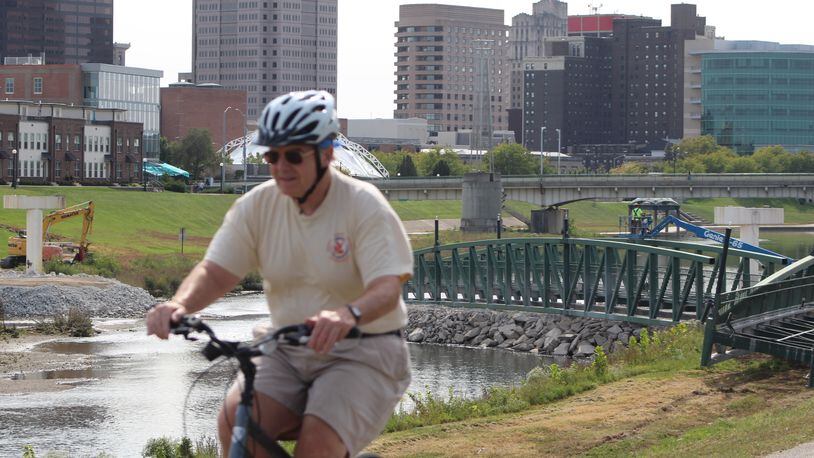“In talking to colleagues across the country, everyone has seen a spike in people getting outside,” said Becky Benná, Five Rivers MetroParks’ executive director.
Some medical experts fear the pandemic is contributing to unhealthy lifestyle and eating habits that can cause chronic diseases and early death.
This newspaper recently found that more Montgomery County residents died last year than in any year in at least a quarter century ― and COVID-19 wasn’t solely to blame, because there were more deaths from heart disease, diabetes and stroke.
“It is so important to stay active and continue to move each day,” said Sarah Hackenbracht, the president and CEO of the Greater Dayton Area Hospital Association. “We may have lost some of the routine activities that were built into our days prior to COVID-19 ... but our MetroParks are still here. Rediscovering them is a gift you can give to yourself and your family in 2021.”
Five Rivers MetroParks saw park attendance grow to 3.8 million visits last year, up from about 3.5 million in 2019, the organization said.
More people visited the MetroParks even though their facilities hosted just three special events in 2020 ― down from 174 the prior year. The events drew 3,090 visitors last year, which is less than 1% of the total attendance of 2019′s special events.
Cancelled events last year included the summer music series, 5k runs, Celtic Fest, the Hispanic Heritage Festival, the Germanfest Picnic and the Wagner Subaru Outdoor Experience at Eastwood MetroPark.
Additionally, the 2nd Street Market, a popular farmers’ market in Webster Station, also shut down its inside space, which is narrow and makes it nearly impossible to socially distance.
But an outdoor farmers’ market ran from May to the end of October, and that may reopen on Saturdays beginning at the end of March, depending on the weather.
Benná said it is too soon to tell if some of MetroParks annual special events will return this year. Many of the larger events and festivals require a great deal of advance planning and commitments.
“Our staff is working really closely with each of the organizers of those big events to determine if there is something that can happen this year,” she said.
MetroParks’ facilities were so popular last year, especially early in the pandemic, that the organization had to take some steps to avoid overcrowding.
Parking was restricted at Cox Arboretum and Sugarcreek MetroPark, and some narrow trails were converted into one-way paths.
Signs were installed asking visitors to socially distance and wear masks, and MetroParks staff also worked to educate visitors about the safety rules.
The coronavirus crisis has been a major source of stress and uncertainty, but many community members have said the MetroParks have been very beneficial to their physical and mental health, Benná said.
A Pew Research Center survey last year found that more than half of U.S. adults spend time outdoors everyday to help them cope with the COVID-19 crisis. More than a quarter of respondents also said they spend time outdoors every week to help deal with the pandemic.
MetroParks also welcomed some new users last year, who were looking for ways to relax, explore, exercise, connect with nature and have activities to do with their kids and loved ones, said Benná.
Credit: Shon Curtis
Credit: Shon Curtis
MetroParks has encouraged people to stay active during the pandemic through programs like a trails challenge and a “holiday gnome” hunt. MetroParks has about 160 miles of trails for hiking, cycling, mountain biking and horseback riding.
People stuck at home are at risk of slipping into a more sedentary lifestyle and making poor eating choices, which can result in weight gain, future comorbidities, higher blood pressure, heart disease, diabetes and weakened immune systems, said Natalie Stratton, an exercise physiologist with Kettering Weight Loss Solutions, which is part of Kettering Health Network.
Stratton said many of her clinic’s patients have struggled with depression and anxiety during the pandemic, and some have had a hard time staying motivated when it comes to physical activity.
But exercise is an effective stress-reliever and mood enhancer, partly because it releases endorphins, she said, and walking is one of the easiest ways to stay or get in shape.
Local parks have walking and hiking trails and other amenities, she said, and they provide a change of scenery and fresh air, which many people prefer over treadmills and other indoor fitness options.
Just because it’s cold out doesn’t mean people have to go into hibernation, because they can bundle up and go for a walk, hike or bike ride, or they can go sledding, Stratton said.
People can also exercise inside by stair climbing, jumping rope, body weight exercises and free YouTube work-out videos, she said.
Physical activity is one of the most important things people can do to prevent heart disease and improve personal well-being, said Tim Lewis, community impact director with the American Heart Association in Dayton.
“Studies have shown that for each hour of regular exercise we get, we will gain about two hours of additional life expectancy,” he said.
The MetroParks are free, accessible and open year-round, and Lewis said the parks are a vital resource community members can turn to for healthy habits and reducing stress.
About the Author
